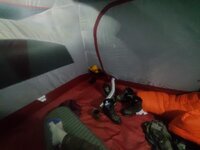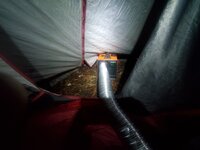High consequence topic here gents.
Navigation
Install the app
How to install the app on iOS
Follow along with the video below to see how to install our site as a web app on your home screen.
Note: This feature may not be available in some browsers.
More options
Style variation
You are using an out of date browser. It may not display this or other websites correctly.
You should upgrade or use an alternative browser.
You should upgrade or use an alternative browser.
Let’s talk carbon monoxide poisoning
- Thread starter Ucsdryder
- Start date
There is flexible hose that comes with. How you put that in your tent idk.Yeah, and how exactly do you vent it to the outside? Is there like a flexible exhaust hose you stick out the tent door and zip up around it?
go_deep
dWKR
- Joined
- Jan 7, 2021
- Messages
- 2,997
Years ago I almost died from a propane heater, but it wasn't from the heater, the relief valve was slowing leaking on the tank. Had the heater setup in the garage, 20# tank and all, garage is attached to the house and our dog was going ape crap in the house by the garage door. My wife finally opened the door thinking he wanted to come out with me, as soon as she opened the door he ran away and she could smell something was off. When I stood up, I almost went face forward into the floor. Took me about half a day to recover and I can tell you, I had no idea it was killing me slowly just sitting there working away.
I've always heard and read you need 2 CO2 detectors, one placed just below where your head would be when you sleep, and one just above where your head would be when you sleep.
I've always heard and read you need 2 CO2 detectors, one placed just below where your head would be when you sleep, and one just above where your head would be when you sleep.
Rotnguns
WKR
I vote for a non-CO heating source as suggested in several other comments. I've got a real sad story to share about this. One of my colleagues, a great guy if a bit absent-minded, took his scout troop camping years ago. It was a cold day so he inflated his air mattress with exhaust from a truck. The kids found him dead of CO poisoning in his tent in the morning - of course, the mattress had a slow leak.Looking at the weather I’m about to free my twig and berries this weekend. Rather than the wall tent and wood stove I’m thinking truck and buddy heater. I’d like to wake up in the morning so I’m looking at a battery operated carbon monoxide detector…
Does it matter which one? Do I put it on the floor or ceiling? I believe floor. I plan on opening both side windows to create a cross draft, but I’m not sure if I need to crack 1/2” or 3”.
Any other tips and tricks?
This is the one I was eyeing.
You can leave the entire unit outside and just pump in the hot air with a vent hose. Lots of YouTube videos out there showing exactly how it works… it’s not complicated.Yeah, and how exactly do you vent it to the outside? Is there like a flexible exhaust hose you stick out the tent door and zip up around it?
Robobiss
WKR
- Joined
- Jan 3, 2024
- Messages
- 357
Exactly.Not a chemist, but as I understand it the issue arises when you use it in a small enclosed space like a tent without the vents open or a sealed up truck camper. In that environment, where you and the heater are both eating through the available oxygen, the burning becomes inefficient and CO levels rise. Like you, I wouldn't sleep with one.
Most purpose built heating units (like the Mr. buddy) have a “low oxygen shutoff” and are designed to shut themselves off if oxygen gets to a certain level where combustion producing CO might start to be a concern.
But I wouldn’t trust that as far as I could throw one.
missjordan
WKR
Bring a detector for peace of mind. You’d be glad to have it if the detector went off unexpectedly
Sent from my iPhone using Tapatalk
Sent from my iPhone using Tapatalk
TSAMP
WKR
- Joined
- Jul 16, 2019
- Messages
- 2,056
A friends uncle just died in WY last week due to this topic while hunting. Fell asleep solo in a trailer with heater going. I don't have particulars other than his hunting partner left the day before and it was propane heat.
Very real consequences
Very real consequences
RyanT26
WKR
- Joined
- Apr 8, 2020
- Messages
- 1,577
Do you use deep cell batteries or regular vehicle type batteries?
A friends uncle just died in WY last week due to this topic while hunting. Fell asleep solo in a trailer with heater going. I don't have particulars other than his hunting partner left the day before and it was propane heat.
Very real consequences
I’m real sorry to hear that TSAMP. I frequently irrationally worry about this while sleeping in my travel trailer. Did he have any detectors in there?
Sent from my iPhone using Tapatalk
Sorry to disagree, but the specific gravity of CO is 0.9675, which is slightly lighter than the specific gravity of air which is 1. Further, CO is generally generated by heating equipment (such as Buddy Heaters) that generate warm air, which rises.CO is heavier than air, so the CO detractor should be mounted close to the floor. The Kidde CO detectors in my house are sensitive to CO and seem to work well. I’d suggest buying a battery powered Kidde CO detector. Even with a CO detector I would be leery of using a LP heater in an enclosed space.
Listen, please forget any of this scientific BS and don't sleep in an enclosed space with anything that can generate CO. You're inviting potentially eternal sleep in these situations.
The diesel heaters are great. You can pick up a cheaper power station and run a single heater for 3 days. You can put the whole unit outside and even run your air intake (not for the combustion chamber) into the tent. The best all-in-one that I have found is the Hcalory toolbox style one. Comes with a 12v to 110v converter. Also runs on bluetooth.
We still use a CO monitor inside. Also use a Mr. Buddy heater for the mornings. Since propane tank is inside, we also have an RV 12v explosive gas meter that also runs on the DC port of the power station.
We still use a CO monitor inside. Also use a Mr. Buddy heater for the mornings. Since propane tank is inside, we also have an RV 12v explosive gas meter that also runs on the DC port of the power station.
I have used the Mr. buddy for years, abate with vents open. No doubt CO detector is the only way to go. My thing as stated by so many, they are danergous. Why are they not banned or whatever by the requlatory agency's? Just a question, not a arguement. I know of many sad stories of people dying in their houses from CO natural gas and propane house furnaces. I put Co detectors in my cabin years ago after reading the newspaper about a families death. Never much thought about it before that.
Not sure if it's the same incident as TSAMP referred to, but there were 2 guys died last week west of Cody from CO poisoning. One was a pastor in town, the other a taxidermist. Don't know the specifics, but believe it was in a camp trailer of some type.
My hunting partner used to heat his tent with a buddy heater and a co detector - a couple years ago during elk season we didn’t want to set up the wall tent and used his buddy heater setup - I woke up in the middle of the night really nauseous. I was suspicious of the buddy heater so I turned it off and got out of the tent to take a leak. Almost instantly felt better with the fresh air. Co2 detector never went off.
I still use mine in the wall tent for mornings and evenings but definitely will not sleep with one ever again.
I still use mine in the wall tent for mornings and evenings but definitely will not sleep with one ever again.
TSAMP
WKR
- Joined
- Jul 16, 2019
- Messages
- 2,056
Same incident, I was mistaken, he was not aloneNot sure if it's the same incident as TSAMP referred to, but there were 2 guys died last week west of Cody from CO poisoning. One was a pastor in town, the other a taxidermist. Don't know the specifics, but believe it was in a camp trailer of some type.
I stand corrected, I always thought CO was heavier than air. Thank you.According to the internet:
"Carbon monoxide is lighter than air. It also rises with warm air, so the United States Environmental Protection Agency (EPA) recommends placing a carbon monoxide detector on a wall about five feet above the floor or about eye level. You can put them on the ceiling, too."
In my converted cargo trailer I have Dickenson fireplace (sealed with fresh air intake and exterior exhaust) but for peace of mind I have a propane detector low to the ground and a CO detector on the wall about a foot from the ceiling.
A 1000w heater really won't do much. Then there's the fact that a fairly large power station would only give an hour of heat, then take 4-5 hrs to recharge with a generator. Most portable solar panels are only 100w or so in direct sunlight.Why not a battery bank and an electric heater. Get something that you can charge with a solar panel so it extends the battery life.
Similar threads
- Replies
- 69
- Views
- 3K
- Replies
- 5
- Views
- 502
- Replies
- 5
- Views
- 1K
Featured Video
Latest Articles
- TT#64 Josh Boyd Elk Hunting Strategies for Every Season
- Aaron Davidson of Gunwerks
- TT#63 Dirk Durham’s Art of Elk Calling
- BIG Buck Stories with the Dirty Giants Podcast
- TT#62 Brian Barney Hunting Bulls without Calling
- Hoyt Alpha AX-2 SD Review
- Kuiu Kenai vs Outdoor Vitals Vario Hooded Jacket Review
- Hoyt RX-9 Ultra Review
- Hunting Vampire Bucks & Building an Optics Kit
- Darton Sequel ST2 35 Review


